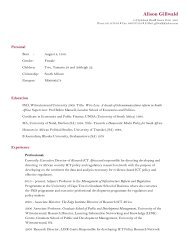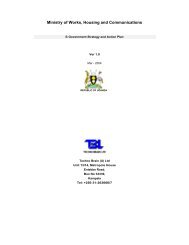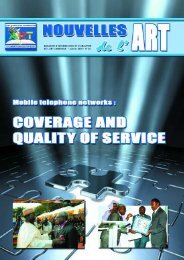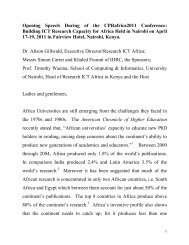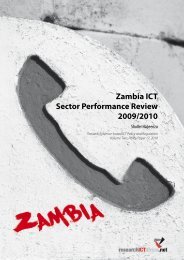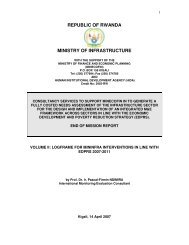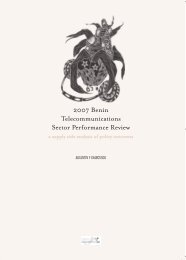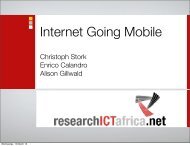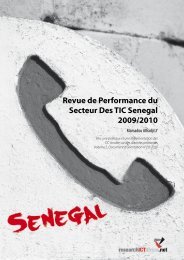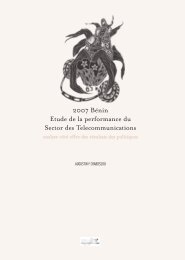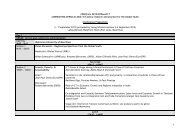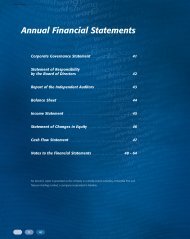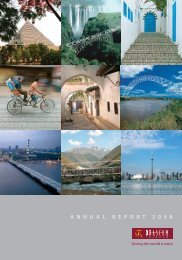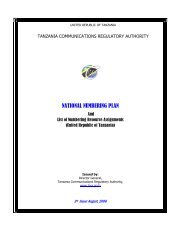Rwanda Telecommunications Sector Performance Review 2007
Rwanda Telecommunications Sector Performance Review 2007
Rwanda Telecommunications Sector Performance Review 2007
Create successful ePaper yourself
Turn your PDF publications into a flip-book with our unique Google optimized e-Paper software.
<strong>Rwanda</strong><br />
<br />
<br />
<br />
<br />
Transform education using ICT to improve accessibility, quality and<br />
relevance;<br />
Improve human resource capacity to meet changing needs of the<br />
<strong>Rwanda</strong> economy;<br />
Develop the laws, institutions and regulations to support wide use of<br />
ICT;<br />
Facilitate national reconciliation and reintegration through ICT<br />
interaction.<br />
The expected quantifiable results from these strategies are:<br />
A progressive reduction in the contribution of agriculture to the economy<br />
from the current 75% to about 50% by 2015 and 40% by 2020; and<br />
At the same time an increased contribution from the services and<br />
industrial sectors. (The ICT sub-sector was estimated in 2000 at<br />
about 10% of the economic contribution of the industrial sector).<br />
In summary, the goal is to make <strong>Rwanda</strong> a Predominantly Information<br />
and Knowledge Economy (PIKE), thereby reducing the role of the agriculture<br />
sector as a major contributor to the economy.<br />
Regional and International Policy<br />
and ICT Initiatives<br />
Following a long struggle starting in 1996, <strong>Rwanda</strong> has finally been<br />
admitted to the EAC this year (2006). Kenya and Uganda are key trading<br />
partners for <strong>Rwanda</strong> and it therefore makes sense to formalise these ties<br />
through EAC membership. <strong>Rwanda</strong> is also a member of the Common<br />
Market for Eastern and Southern Africa (COMESA). It benefits from<br />
membership in the Association of Regulators for Information and Communication<br />
in Eastern and Southern Africa (ARICEA) and from the<br />
COMESA ICT policy that was developed to serve as a policy model for the<br />
harmonious development and application of ICT within member states<br />
with the view of turning COMESA itself into an information society. The<br />
policy framework focuses on providing affordable, ubiquitous and highquality<br />
services, building a competitive regional ICT sector, and creating<br />
an enabling environment for sustainable ICT diffusion and development<br />
(Butcher 2006). However, the regional framework does not provide<br />
guidelines and approaches for broadcasting, Internet and postal services,<br />
nor applications such as e-commerce, e-education, e-government,<br />
e-agriculture and e-health.<br />
In order to achieve the above objectives, member states including<br />
<strong>Rwanda</strong> are encouraged to adopt new approaches that can enable interconnectivity<br />
between all operators and service providers within the<br />
region, promote universal service/access, encourage competition in the<br />
sector through the removal of barriers to entry, and establish an appropriate<br />
licensing regime that is transparent and conducive to investment<br />
12 <strong>2007</strong> <strong>Telecommunications</strong> <strong>Sector</strong> <strong>Performance</strong> <strong>Review</strong>



